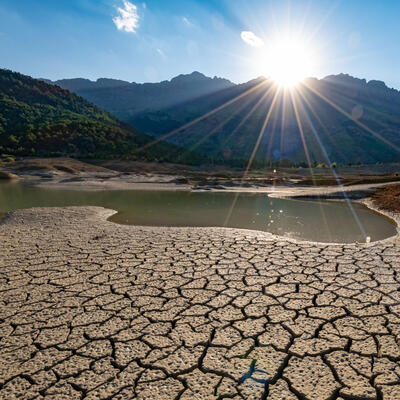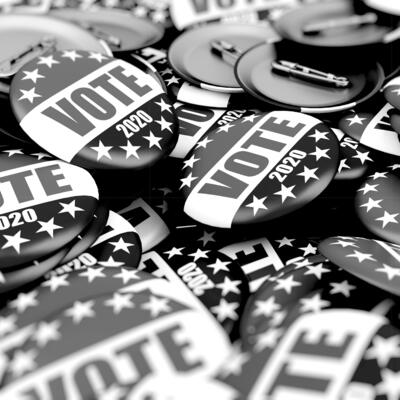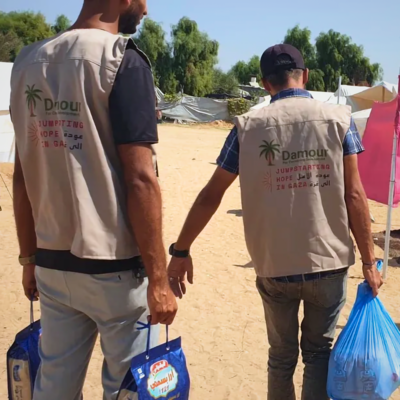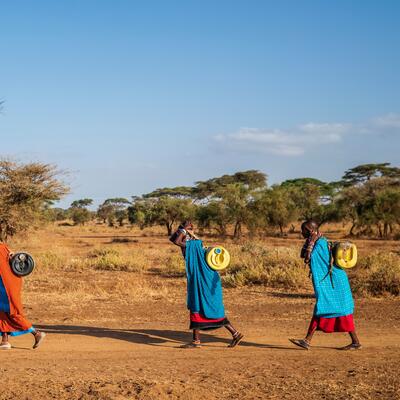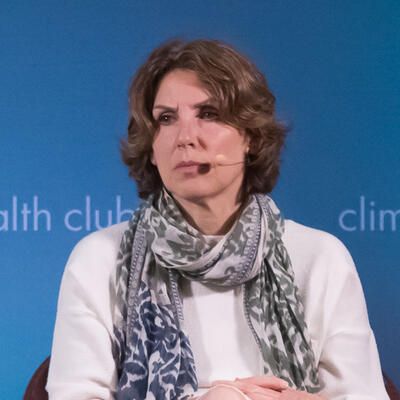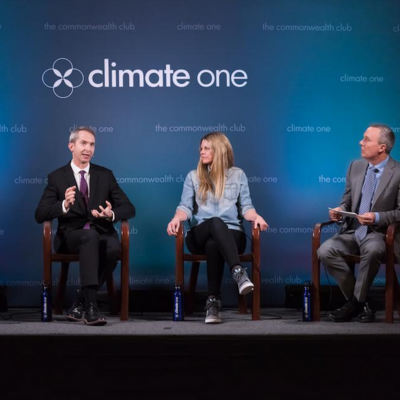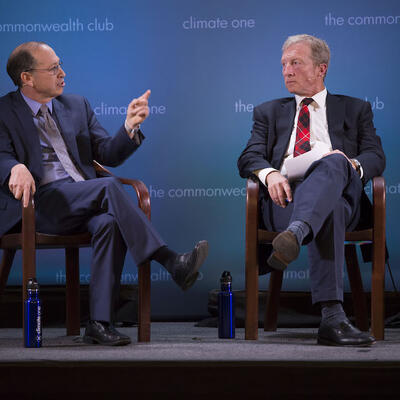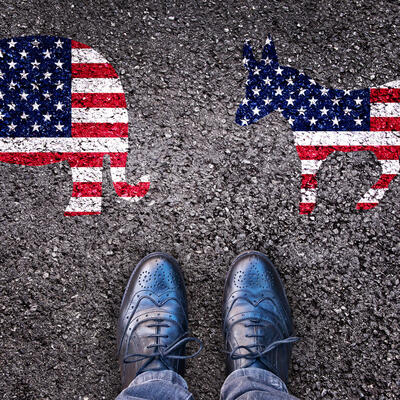
Which Way Are Swing Voters Swinging on Climate?
Guests
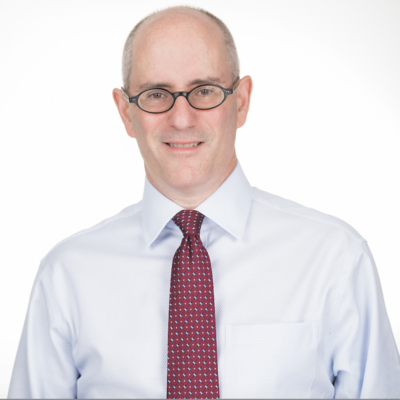
Rich Thau

Andrew Freedman
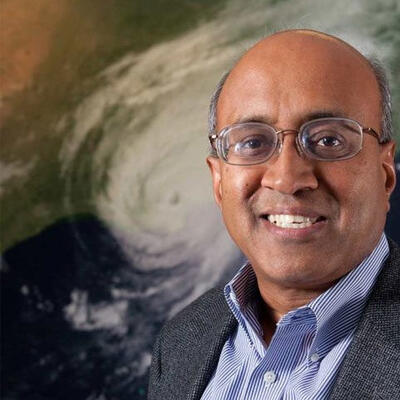
Venkatachalam “Ram” Ramaswamy
Summary
In early August, the Intergovernmental Panel on Climate Change released a report unequivocally connecting global warming and extreme weather to human-driven greenhouse gas emissions, and warning of much more dramatic climate futures if we don’t change course soon.
Venkatachalam “Ram” Ramaswamy is Director of NOAA’s Geophysical Fluid Dynamics Laboratory and Professor of Atmospheric and Oceanic Sciences at Princeton. Since 1992, he’s been involved in writing and editing these IPCC assessment reports. He’s a review editor of Chapter 7 of the most recent report.
He says this latest assessment has gone further in terms of regional climate projections, especially extremes.
“And not only extremes, but also compounded extremes. So for example, excess precipitation followed by floods, heat waves followed by air quality degradation, fires and atmospheric composition,” Ramaswamy says.
UN Sec. Gen. Antonio Guterres called the recent IPCC findings “code red for humanity.” But Rich Thau with the Swing Voter Project says many people aren’t hearing those alarm bells.
“The focus groups that we did on August 10th certainly confirm that. We had 13 Trump to Biden voters, people who voted for Trump in 2016 and then Biden in 2020. And only three of them had heard the news, which had come out the day before, about the IPCC report,” he says.
Since the 2020 election, Rich Thau has been hosting monthly panel discussions with swing voters in key swing states. These are what he calls “low-information voters,” who typically get their news from local or cable news sources. Thau says those who want to advance the climate cause need to improve their messaging.
“The people who are trying to advance this agenda, and obviously setting aside the White House, I think have a unique opportunity that they have yet to seize. And that is to find the people that I’m focus-grouping — people at the tip of the spear electorally — and get a lot more of the messages that they need to hear about what still can be done and get those through to them,” he says.
He asked his focus groups whether hearing news about accelerating climate change caused them to want to take action.
“Four of them said that. Three of them said it immobilized them — that they had found it so overwhelming they couldn’t react. And then six of them said they basically avoid it,” Thau says.
As the recent IPCC report showed, we need to make big changes now to stave off the worst possible future outcomes. Axios climate reporter Andrew Freedman agrees that the messaging, especially what people hear from their news sources, matters.
“We have to think about ways to communicate this issue in ways that make people feel at least like there's something to be done or that they know how to channel their emotions,” he says. “It's not my job as a journalist to tell somebody ‘you need to call your Congressman and you need to do this and this and this.’ That’s not what I do. But at the same time, it isn't my job to just scare the daylights out of somebody and leave them despondent.”
Freedman says while the IPCC report is alarming, we still have many choices about how we respond in the coming decades. But time is of the essence.
“The window for action is now. The best window for action in Washington is the next four to six months. After that maybe in 10 years. And we don’t have 10 years,” he says.
Related Links:
Full Transcript
Greg Dalton: This is Climate One. I’m Greg Dalton. The 2020 electoral college vote was decided by roughly 44,000 voters in three states. But many of those voters don’t know much about our climate emergency. Rich Thau with the Swing Voter Project says those who want to advance the climate cause need to improve their messaging.
Rich Thau: To find the people that I’m focus-grouping. People at the tip of the spear electorally, and get a lot more of the messages that they need to hear about what's still can be done and get those through to them.
Greg Dalton: As the recent IPCC report showed, we need to make big changes now to stave off the worst possible future outcomes.
Andrew Freedman: The window for action is now. The best window for action in Washington is the next 4 to 6 months. After that maybe in 10 years. And we don’t have 10 years.
Greg Dalton: How swing voters are thinking about climate, up next on Climate One.
Greg Dalton: How much do swing voters care about climate? Climate One’s empowering conversations connect all aspects of the climate emergency. I’m Greg Dalton. Since the 2020 election, Rich Thau has been hosting monthly panel discussions with swing voters in key swing states. His Swing Voter Project has been querying those who voted for Trump in 2016 and for Biden in 2020. Joining our conversation is journalist Andrew Freedman, who covers climate and energy for Axios.
Greg Dalton: So Rich, let’s begin with you. UN Sec. Gen. Antonio Guterres called the recent IPCC findings “code red for humanity,” adding that alarm bells are deafening and the evidence is irrefutable. Are swing voters hearing those alarm bells?
Rich Thau: They’re really not, Greg. And the focus groups that we did on August 10th certainly confirm that. We had 13 Trump to Biden voters, people who voted for Trump in 2016 and then Biden in 2020. And only three of them had heard the news, which had come out the day before about the IPCC report. So, for us there was not deep penetration into their psyche about what was happening and what seemed to me to be pretty major news like a huge amount of airplay and print play the day before.
Greg Dalton: Right. And tell me about these voters, these are what you call low information voters and they told you where they get their information from. Tell us about that.
Rich Thau: Yeah. So, these voters get their news from a variety of different sources. Some of them get their news from local news sources, local news organizations in the communities where they live. And by the way these voters all live in among the 10 most competitive 2020 swing states. So, we’re not talking about people in Alabama, for example, or in Massachusetts we’re talking about upper Midwest in places like Arizona, Texas, Georgia, Florida, North Carolina and so forth. So, they get their news from either local news sources or really get their news from CNN or Fox from cable news and elsewhere. But the thing is they seem to be missing some of the biggest news stories that are out there. And last month for example, I asked about what was happening with the transportation bill winding its way through Congress. And most of them hadn't heard that there was such a bill going through Congress. So, for me, this becomes sort of one dispiriting conversation after the next. We realize that certain things don't get through, but certain things do get through. For example, all the respondents a month ago back in July knew that a building had collapsed in Surfside, Florida. So, that hadn't escaped their notice at all, but some of the big longer-term issues, the things that have great political relevance like how many trillions of dollars Congress is going to spend on infrastructure for example, they're not paying close attention.
Greg Dalton: Yeah, TV is drawn to those dramatic stories. In the focus group you played a two-minute clip from the CBS evening news. It highlighted the recent UN report as code red for humanity. Let’s hear that clip.
[Start Playback]
Male Speaker: Scientists say the planet is warming faster than at any time in at least 2000 years.
Female Speaker: Climate change is a problem that is here now. Nobody's safe and it’s getting worst faster.
[End Playback]
Greg Dalton: Clip goes on with greater detail laying out the evidence. Well, first of all Rich, this was on mainstream network news yet it seemed like very few people knew about it.
Rich Thau: Yeah, we had people say, for example, well, I don't have time to watch the nightly news. People who said they heard little strands of this information here or there but they hadn’t heard a report like this one that pulled it all together. So, to me I think that's also part of it is that they're hearing individual notes but they’re not hearing the whole song.
Greg Dalton: Right. There was one respondent who said he had heard about drought in the West, but he hadn't heard about floods in the East. They haven’t kind of put together the whole country. One of your panelists Greg L from Pennsylvania said he saw the headline but intentionally did not want to learn more. Let’s listen.
[Start Playback]
Greg L: Come to think of it, I did see that on CNN. And it did sound pretty bleak. It did kind of give some hope but it sounded like we were far, we are closer to the pivot point than we thought. It’s accelerating more rapidly so I didn’t want to read the article.
Rich Thau: Didn’t want to read the article, Greg, news was too bleak.
Greg L: Too bleak, yeah. With all that’s going on I don’t need any more.
[End Playback]
Greg Dalton: So, let’s get to that. How do emotions play into news that gets through and what doesn’t? This was really interesting for me and I wanna get to Andrew in a minute here about the work that we do dispersing information, if the people's emotions are preventing them from hearing our work.
Rich Thau: Well, that was the thing Greg that was so interesting. One of the questions I thought was or sort of answers to the questions I felt were most interesting had to do with sort of emotionally how they deal with this. And I ask people which of three categories they fell into whether hearing this kind of news caused them to want to take action. And four of them said that. Three of them said it immobilized them. That they had found it so overwhelming they couldn’t react. And then six of them said they basically avoid it. So, we got 4 out of 13 basically who are responding. And by the way, the way those people respond is to find plants they don’t have to water as much in their garden, buy more sustainable products, not buy things with palm oil for example. This was the examples we heard in recycling of course, recycling always comes up as the way people contribute and try to deal with climate change. So, again you look at the totality of what people do or say they do or are willing to do. And frankly, in my estimation, it doesn't add up to a whole lot.
Greg Dalton: Andrew, I’d like to get you in here because this is the moment where I question whether I have done, am doing the right job. You put out interesting articles on Axios that are tagged one minute read or three-minute read is a long one. How does this make you feel about the information we’re putting out as media people?
Andrew Freedman: You know, I try not to think about it too much. It’s depressing I think, you know, climate reporters overall, I think are very aware of the emotional weight of this issue at this point. We feel it ourselves. I communicate with a group of climate reporters some of us had kids around the same time and all of us started to think about the subject matter differently. And we could no longer talk about 2030, 2040 projections and kind of separate that in our heads suddenly it was when my kid is 10 or 12 or whenever. And there really is an emotional weight of this and this report came out every headline was I wouldn't say alarmist in the sense that it was overly alarmist. It was matching the tenor of science and it was conveying what scientists were saying, which was essentially you know we have to press the brakes on this thing now or we are in for potentially catastrophic impacts. And it actually read conservative to me some of the language if you actually read the report, you could see that the scientists were kind of holding back. If they were allowed to, they would have just you know use swearwords starting like half of that report I'm pretty convinced. So, as somebody who communicates on this issue on a daily basis, I’m acutely aware of that fear and alarm is immobilizing. Now that doesn't mean I'm not going to tell people there's a category five hurricane coming towards them, and it's scary. It's more that we have to think about ways to communicate this issue in ways that make people feel at least like there's something to be done or that they know how to channel their emotions. So, it's not my job as a journalist to tell somebody you need to call your Congressman and you need to do this and this and this. That’s not what I do. But at the same time, it isn't my job to just scare the daylights out of somebody and leave them despondent you know that there is somewhat of a middle ground there. And there were some headlines that were basically like you know it's just too late and when you tell people well, it's too late to do much where they just throw up their hands and goes about their business. And that's not really the case we have choices of what we want to do now. We have choices in 10 years. We have choices in 20 years we can let this go on as long as we want. I mean we have agency over this.
Greg Dalton: Right. I think about of someone who smoked for 30 years there’s been damage done but there can still be a lot of choices you can get healthy and affect the future. We do have a lot of choices and more power than perhaps you realize. Rich Thau, I’m thinking about the building collapsed in Florida is alarming. Why does that get through but somehow the news that Andrew is talking about doesn't?
Rich Thau: Well, maybe Andrew wants to take this question.
Greg Dalton: Yeah, Andrew.
Andrew Freedman: Well, I think it plays better on TV.
Greg Dalton: But isn’t weather porn and droughts and fires that’s great TV.
Andrew Freedman: It is. But what happens with that what happens with weather porn is that they send a reporter out, they'll stand next to the fire zone, they'll talk about how big the fire is and then they’ll toss it back to the anchor. They don't make the connection to climate, not explicitly. Maybe they will be more and more, but still on network evening news, you know, watchdog groups that look at this say those connections still aren’t being made. So, the weather porn aspects very much you know allows it to rocket up the top story. But a building that just randomly collapses and you have surveillance video and you have people desperately searching and the question of will other buildings do the same in the same region. I mean it’s just a story that just seems more like something that’s designed to capture the human imagination a little bit more than oh my god there’s disasters all over the world and they’re increasing and you know.
Greg Dalton: Right. And I think academics talk about agency. What can I do about it. And you can choose not to live in a waterfront condo in Florida, for example. And we have Michael Q., a swing voter from Dallas, Texas and here's his reaction about his feeling of agency or lack of agency.
[Start Playback]
Michael Q: Should we take federal government money and put it towards how are you gonna stop a tornado how are you gonna stop a hurricane? You guys were talking about try and issue federal money towards averting those disasters and avoiding them? I didn’t raise my hand because I don’t know how are you gonna stop a tornado I don’t know how are you gonna stop Katrina, I don’t know how are you gonna stop wildfires. I mean just because you throw money at it that’s a natural disaster, you know, it just happens.
[End Playback]
Greg Dalton: Rich, let’s get your take on that feeling of kind of helplessness there that Michael is expressing and how that relates to what we hear from these swing voters.
Rich Thau: Yeah, I didn't interpret as much about helplessness, although that's clearly part of what he’s saying. It was also a sense that we don't want to waste government money trying to stop something that's going to happen anyway. And there are certainly I think with people whose politics lean at least a little bit right and still among people who are further right. There is just a sense that this is sort of a left-wing government boondoggle. And if you read George Will column about this in the Washington Post that came out on August 12 the same kind of implication about this, which is that this is more about the left trying to impose their larger agenda and they just found climate as a way to do that. So, I might be over reading what he said but when I start hearing comments like government spending, having to do with climate and weather-related events there’s a real skepticism there and that's been around for a long time and I think is going to persist for a long time. And the other thing I’d say about this too, Greg, because obviously you cover climate is, I think there is a lot of false expectations about what can be done being conveyed to people. And what I mean by that is, at best we can try to limit the increase in warming over the next several decades which will still lead to unbelievable amounts of unpleasantness like we’re seeing right now. The idea that we’re gonna roll it back to the way it was the amount of carbon in the atmosphere the way it was in 1950 or in 1850 or pick some date in the past, we’re not capable and able to do that now. So, the idea that the government spends all this money that these bad things are gonna stop or they’re gonna happen significantly less often and are happening now is not something that people I think should be told can happen it’s gonna set a lot of false expectations. And because of that and the thing and my concern about this is that when people see that trillions of dollars are being proposed to be spent to sort of fight global warming and they don't see an impact in their day-to-day lives or the change in the way the world is functioning they’re gonna be even more cynical about what happened and why it was pushed upon them. So, I'm not saying that we shouldn't deal with it I think it's a clearly a huge, huge crisis it’s a massive problem we have all these things we have to deal with I think about it all the time. But I think we have to be very careful in terms of our communication about what's reasonable in terms of what we can do and what's reasonable about what the outcome would be of the things that we can do because managing expectations is critically important.
Greg Dalton: Andrew Freedman, do you think our ability to affect the climate is being oversold?
Andrew Freedman: Yes and no. I think that we have the ability to significantly affect the course of things beyond the next couple of decades. So, you know, the IPCC report actually goes into some detail on where outcomes start to diverge. So, if you bring emissions down on a very aggressive basis. What year do you start seeing that in global average temperatures in heat waves in sea level rise that sort of thing. And there's some things that they call essentially irreversible on human timescales, which is sea level rise mainly when they start bringing ice sheet melting kind of hard to turn it off. But it’s not that hard to stop the escalation of heat waves for example, if you look at 2040, 2050 timeframe. And you're talking about, you know, your hottest heatwave now, so a Pacific Northwest heatwave that they had in June, which may have killed upwards of 600 people, it turned out. Whether that’s gonna occur once every five years or whether that’s gonna occur once every 30 years and that makes a very big difference. But there are people out there like Bill Gates and some other like techno-optimists who are basically saying you know we need to invent our way out of this and invent things that can suck carbon out of the air and essentially do what Rich said we can't do, which is, kind of turn the clock back to the amount of carbon that was in the atmosphere decades ago. And in theory, if you invent synthetic trees that are effective enough and other things you could do that, eventually. But I think it's a risk management problem and I think that the way the Biden administration is selling it is as a jobs program. The way that most climate communicators look at it and climate reporters is that it's a risk management issue. And it's not an issue of like how are you gonna stop a hurricane, we can’t. But what we can do is potentially better prepare coastlines for the sea level rise we’re gonna see better prepare for storms that might be coming and try to forestall the worst of the worst. I talked to the climate minister from a small island country yesterday. And this is an existential issue for some people. To him, the difference between, you know, 2-foot to 3.5-foot sea level rise is the difference between a country and no country. So, if we can modulate that by reducing emissions through 2050 and then we affect the outcomes beyond that's big. But is that gonna affect people, you know, be seen in people's backyards the next 2 to 3 years when the next presidential election comes? No. So, you know, the critical payoff question comes in there.
Greg Dalton: You're listening to a conversation about how voters in swing states are feeling about climate. This is Climate One. Coming up, journalist Andrew Freedman reflects on the way people choose to engage with news about climate disruption:
Andrew Freedman: So, that's why it was so enlightening and so depressing to be part of this focus group to see how much people knew or didn't know, and how much people switched off at the opportunity to know more.
Greg Dalton: That’s up next, when Climate One continues.
Greg Dalton: This is Climate One. I’m Greg Dalton. We’re talking with Rich Thau of the Swing Voter Project and Axios climate reporter Andrew Freedman about the climate views of swing voters during the lull between election cycles. Last fall, Joe Biden beat Donald Trump by 7 million in the popular vote but the electoral college was determined by 44,000 people in Georgia, Arizona and Wisconsin. I asked Rich Thau to explain the insights his Swing Voter Project has offered about the people that play this outsized role in our national politics.
Rich Thau: These are the folks we’re talking to every month the people in those states, and the other seven states that were close in the last election. And every month we try to find out where they stand on leading issues. And what I can tell you about them is that they pay close attention to some things we talked about. They pay much less attention to other things. They soured on Donald Trump having voted for him at various points in the last 4 1/2 years. Some soured on him very early. Some waited until the pandemic to sour on him, but they all had their reasons. And many of them voted for Joe Biden because they just wanted to see things calm down in the country. When I asked them what emotion they feel when they see Biden on TV it's calm, it's reassured, a number of them say the emotion they feel and they really don't want Trump back. They don't have much use for him. This month for the first time since I started asking the question in January, I asked them how many of you regret having voted for Biden? And of the 13, two told me they regretted it and that they would take Trump back if Trump were running against Biden again. But almost every month it's unanimous or just one person dissenting that they would stick with Biden and not vote for Trump again.
Greg Dalton: Andrew, you write the daily Axios Generate along with Ben Geman. You noted recently, “The Biden White House is viewing rising gasoline prices as a source of potential political peril to the point where they're encouraging OPEC+ to pump more oil even though that's at odds with their climate policy.” There was a very awkward moment where White House press secretary Jen Psaki was trying to square that and say that we need more oil while we’re trying to get off of it. So, at the same time that’s, you know, we’re hearing from Rich that people don't think that much about this. What's going on with the politics of that?
Andrew Freedman: You know, the politics of that issue is really fascinating because really, what they're worried about is they’re worried about inflation. And they're seeing the Republican argument on the economy start to stick in congressional districts. And they’re seeing swing districts Democrats realize what the polling is and what they're facing. And one of them, one very important Democrat recently decided to bow out of the race in Wisconsin. And on the gas price issue, you know, it’s fascinating because they're out there talking about, you know, getting to 50% EV target by 2030, getting net zero emissions by 2050. We’re going to the Glasgow Summit and they’re trying to show progress by passing both of these infrastructure packages. But at the same time, they recognize that the one price that people encounter on a daily basis is the price of gas. So, they see it going up and they often blame the occupant of the office whoever it is, even though the US president has almost nothing that they can do about the price of gas. So, I mean the one thing they can do is release everything in the Strategic Petroleum Reserve, which is ridiculously pronounced spro. And you had Trump who eventually negotiated by getting on the phone with the Saudi king and you have Biden who recently had his national security advisor issue a kind of a broadside memo saying you know what OPEC+ has agreed to is just not enough. And they’re worried that it threatens the economic recovery so they're looking at the Delta strain they’re looking at inflation and they’re looking at gas prices. And they’re saying okay, whoa.
Greg Dalton: And those of us with a, let me jump in here, with a political memory recall the hot summer of I think 2009, where gas was approaching five dollars and that's partly what fueled the Tea Party. So, you know, there is some real pain or trauma for some who remember how painful gas prices can be. But Rich, your panelists unanimously say they don't vote according to gas prices.
Rich Thau: Yeah, well, that’s interesting because we did hear that the night, we did these focus groups. But I specifically ask them about how much gas prices specifically affect their voting behavior and would they vote somebody out of office because gas prices have gone up or they would reward somebody with reelection of gas prices went down. And they all looked at me like I was crazy and said, no. But I will tell you in prior months people have told me they’re concerned about inflation generally. So, you have to think about to Andrew's point this is part of a larger narrative. It's not just the cost of one product, it's the cost of that and everything else. I mean if gas prices go up and everything else goes down, not a big concern. But if it’s gas and milk and rent and you go down the list of things people spend a lot of money on, you're talking about a real problem there.
Greg Dalton: I’d like to play another clip a question from Rich Thau during the focus group and an answer that stood out to me in light of the recent trillion-dollar infrastructure deal.
[Start Playback]
Male Speaker: So, assuming there is new government funding for transportation as a result of legislation currently working its way through Congress. How should the money be divided between roads and public transit? And by that, I mean public transit being things like subways and railroads. You think it should be divided 50-50 between roads and transit? Or do you think it should be skewed in one direction or the other? How many of you think it should be 50-50? None of you. So, all seven of you are telling me that the money should go more toward roads and to transit, okay? Akim, why should it go to roads?
Akim B.: Wow, this is actually something that I’ve never had to ponder. I just think of roads being more freedom, more you doing what you wanna do when you know like you don’t have to pay a fee this way or that way as opposed to transit, you know, that comes with a cost.
[End Playback]
Greg Dalton: That was Akim B. from Pennsylvania. Andrew Freedman, what do you hear when you hear Akim talking about roads and transit in that way?
Andrew Freedman: You know, I hear somebody probably living somewhere that doesn't have an extensive public transportation network, which is many places in the United States. I live just outside DC. And normally I would be taking the Metro everywhere, but because of the pandemic I think of taking the Metro maybe four or five times double masked places just because like the perception of risk which is itself a whole field of study. So, I think people are even more hesitant right now to say oh, we should pour money into public transit because they can't even imagine themselves getting into a compartment with one other unfamiliar person, let alone you know, 25 people on the train.
Greg Dalton: Yeah, I think it's interesting that he sees transit as having a cost where driving a car is free even though he pays taxes when he buys gasoline for the road but somehow that's less visible than a transit ticket. I wanna get back as we approach the end here, you know, there’s more than one of panelists expressed feeling stuck in getting back to this kind of perception, emotion that I think underlines a lot of this as we’re talking about. Here’s Ann B. from Arizona.
[Start Playback]
Ann B: I’m a native to Arizona so I’ve been here over 50 years. And I have physically seen the differences over the years, especially over the last probably decade or less. So, I know that it’s real but it doesn’t make me go oh my gosh I’ve got to go out and completely change my whole lifestyle and go that way. But I also know I can’t ignore it and avoid it because I see it. So, I’m kind of in that stuck phase of you can’t deny what you know, hindsight 20/20 and I’ve got to, you know, you got to accept it but it causes anxiety it causes, you know, stress. Because you can’t avoid it you can’t deny it but I don’t see me going out and moving into the forest and living off the land.
[End Playback]
Greg Dalton: That’s Ann B. from Arizona during this focus group here of Swing Voters with Rich Thau and Andrew Freedman. Andrew Freedman, that brings up for me Al Gore's frog and water that’s, you know, warming so slowly that it doesn't make the frog jump out of the pot.
Andrew Freedman: Yeah, except right now we’re warming so quickly that there are people all around the world who are jumping out of the pond and moving. But it really struck me what she said because people are anxious people do see it. They don't see it everywhere both of the focus groups most recently showed that not everybody responded by saying you know extreme weather is getting worse where they are. More people did perceive it globally that they're hearing about more natural disasters, extreme weather events globally. But, you know, to me it kind of took until people in the focus groups knew somebody affected by one of these disasters for them to really kind of get it. Somebody knew somebody in the heat wave in the Northwest somebody who knew somebody who had to evacuate to wildfire in California. Another person had a parent who had to evacuate because of a hurricane in Florida and they were worried about how many hurricanes they have last year. So, yeah, you know people are like that our risk perception is off, you know, we worry about the thing that's right in front of us. We don't worry about 10 years from now 20 years from now that's just the way we’re built. But part of it is there are so many things that are out of our control over this. I mean it’s not gonna solve the issue with my wife and I suddenly become vegetarian and also buy an electric car and also stop flying and stop at one child. I believe that’s not gonna solve the issue globally. But studies do show that it actually has an impact on people around you. It actually makes you feel more engaged, you're more likely to change your voting habits, and really what needs to happen is that is societal and systemic change. So, what the government does matters who’s in the government matters, paying attention to those issues matters. So, that's why it was so enlightening and so depressing to be part of this focus group to see how much people knew or didn't know, and how much people switched off at the opportunity to know more, because it scared them or was depressing. Now I get it. There's a pandemic there's crime, there's inflation. There's a lot of bad stuff going on right now. So, if you see something like on that CBS news clip the UNEP had of the UN Environment Programme, her soundbite was: it's getting worse. Nobody’s safe. You’re welcome. You know, when really, she should be saying we have the chance to turn it around. We have all these opportunities to turn it around. This is what we could be doing right now. Let's go do this. So much is riding on what action happens now. And I think any climate activist and any person with a memory of what’s happened on the climate issue over the last 20 years will tell you the window for action is now. The best window for action in Washington is the next 4 to 6 months after that, maybe in 10 years and we don’t have 10 years.
Greg Dalton: Which gets to that as we wrap up here the point of, you know, can our democracy solve this, you know, Washington Governor Jay Inslee billed himself as the climate candidate in his candidacy along with Tom Steyer’s faded pretty fast. So, I like to ask you both as we wrap up here, do you think our democracy is up to the task based on what we’re learning about the swing voters that have such a key role or does the system need to be I don’t know say, revolution is maybe too strong, but dramatically disrupted in some way. Can democracy solve, I don’t even like to say solve because as Rich said earlier it's already, you know, there’s gonna be rising temperatures no matter what we do we’re not gonna solve this. But can democracy get the job done, Rich Thau?
Rich Thau: Oh, what I’d say Greg is that I think that the people who are trying to advance this agenda and I obviously setting aside the White House, but people outside of the White House. I think have a unique opportunity that they have yet to seize and that is to find the people that I’m focus-grouping. People at the tip of the spear electorally they're all knowable we know which counties they’re in. We could do a pretty great job if you want to do some data mining to figure out basically exactly who they are and where they live is to get a lot more of the messages that they need to hear about what's still can be done and get those through to them. And I’m not just talking about running ads on network TV that are watched by people who are 75 and older. I'm talking about going where people are themselves watching the media getting their news, either local news, online news wherever it has to be, Facebook, a number of these people get their news that way. And making sure that at least two or three key messages that would drive the political conversation are seen and to whatever degree they can be internalized, but right now this entire conversation is happening where there’s a huge gap between what Biden is saying and what these people are hearing. And I think as long as that gap persists there’s not gonna be the political will to do a lot of the stuff they’re gonna be vulnerable to exactly what Andrew said, which is the charge of it's going to be too expensive or it's going to be ineffective and why are we bothering, it’s hopeless - all the negative messaging is going to get in the way.
Greg Dalton: Andrew, we got about one-minute, last word, can democracy get the job done?
Andrew Freedman: I mean there are all these questions about the future of American democracy right now and how stable we really are. I think yes, I agree with Rich I think that these focus groups really showed when you asked the question what does Biden want to do on climate change maybe one person has a fuzzy description in each focus group. Does Biden support or oppose the Green New Deal, now keep in mind the Green New Deal is not even a bill in Congress; it's systemic change and it’s a proposal and Biden opposes it. These people did not know that. There are Republicans out there running ads saying the Democrats want to implement this radical new deal that's going to come and you know, take away your meat, you know, like, take your steak away. They're going to be vulnerable to that type of messaging if the Biden climate agenda is not defined for them in some sort of message that resonates. So, they think clearly the way the Democrats think the jobs they will get through. I don't know that that's correct. I think that there are other messaging needs and there are outside groups that need to be doing what Rich said they need to be doing on the messaging side. On the reporting side we’ll keep doing what we do, however feckless that is in terms of its effectiveness.
Greg Dalton: I’ve been talking about the climate views of swing voters with Rich Thau of the Swing Voter Project and Axios reporter Andrew Freedman. Coming up, we dig into the latest climate science in the recent IPCC report, and how the data might be used in the upcoming climate negotiations in Scotland:
Ram Ramaswamy: Obviously the 1.5 and two degrees is on people's minds, but also in terms of just, let's say, adaptation purposes, what can we expect about the frequency of extreme events? Can we have a quantification of that, even if it's not exact.
Greg Dalton: That’s up next, when Climate One continues.
Greg Dalton: This is Climate One. I’m Greg Dalton. In early August the Intergovernmental Panel on Climate Change released a report unequivocally connecting global warming and extreme weather to human-driven greenhouse gas emissions, and warning of much more dramatic climate futures if we don’t change course soon. “Ram” Ramaswamy is Director of NOAA’s Geophysical Fluid Dynamics Laboratory and Professor of Atmospheric and Oceanic Sciences at Princeton. Since 1992, he’s been involved in writing and editing these IPCC assessment reports. He’s a review editor of the most recent report. About a decade ago, Bill McKibben wrote an article in Rolling Stone titled “global warming’s terrifying new math” that earned a lot of attention and introduced the concept of a carbon budget into the national conversation. I asked Ramaswamy what scientists know now about how much carbon can be safely put into the sky, and how close are we to that limit?
Ram Ramaswamy: Coming a decade later, we certainly know a lot more about both the energy part of the story, how much is going out, how much is not going out, and where is it going? Where is excess energy going? We also know about the carbon budgets more in terms of not only how much there is in the atmosphere, which of course is available from direct measurements, but also some knowledge, some increased knowledge of the efficiency of the sinks in both the land and ocean. How much carbon can they soak up, given the increased emissions, and are they gonna be as efficient in the future as they have been in the past. So we know much more about that. There still are knowledge gaps, of course, but the knowledge is getting on a more firmer footing than it was a decade ago, and it's telling us really about how much more emissions, if they do occur, is going to result in how much more carbon dioxide in the atmosphere.
Greg Dalton: Sure. And so there's energy coming in in the form of sunlight every day, some energy is going back out, bouncing off ice or the earth and that human activity, burning fossil fuels has disrupted that energy balance or energy budget. How are clouds changing due to global warming and how does that amplifying human-caused warming, 'cause clouds are a big part of this new report.
Ram Ramaswamy: Absolutely, clouds are having one of the biggest uncertainties because of theoretical gaps, lack of observations, and changes in clouds is the most important aspect that we are chasing. There are different kinds of clouds. There are low clouds which are mostly water, and there are high clouds which tend to be mostly ice and then there’s in between clouds which are mixed phase. Historically, in the modeling part of the story, the low clouds have been very important in terms of determining whether clouds are gonna be positive feedback or a negative feedback on the warming caused by CO2 and other gases. And we have been wrestling with that for now quite a few years, I mean more than a decade, about what is role of the low clouds, and now for the first time, the observations, the other constraints in terms of processes, and then the theoretical understanding has improved such that the assessment, AR six actually concludes, now that the sign of the low cloud feedback is likely positive. Which means to say the amplification is, from the low cloud component is gonna be positive, which is something that has been a question all along.
Greg Dalton: So does the amplification make climate change worse or better?
Ram Ramaswamy: It's more warm. If CO2 is warming the climate, it's going to... The low clouds are such that the change in them due to the CO2 increase is gonna make the planet warmer.
Greg Dalton: One of the questions I've heard from other scientists over the years is about the sensitivity of the climate system, basically how hard we can push on this system, how much we can jam into it, and how quickly it will disrupt. And potentially how quickly it would correct if we reduce greenhouse gas emissions, there were some positive news a while back where I said, Hey, we think actually if we stop burning this stuff, it could kind of return to balance quicker than we might have thought. What do we know about the sensitivity of the system?
Ram Ramaswamy: We actually now have a better grounding for establishing the limits of the sensitivity, so there is still uncertainty of course, but what has happened is that now instead of relying entirely on models, there has been reliance on actually four different types of information. And so there's four lines of attack this time, in the sixth assessment report actually has enabled a better quantification and a better grounding for the results that are being shown.
Greg Dalton: So there's greater confidence. Greta Thunberg tweeted that the report, this recent report from the IPCC, the sixth Assessment Report is a solid but cautious summation of the current best available science. One of the observations, the IPCC and science in general, that it is inherently conservative, so tell us about you personally, put aside the IPCC, is this document under-playing the real risks?
Ram Ramaswamy: Right. IPCC does pride itself on doing the best assessment based on the literature in front of them, and I think they do that. One of the things I would point to in this assessment, which I think has taken it further in terms of... Should I say a little bit of boldness but with confidence, is the projection of the regional climates, especially extremes. And not only extremes, but also compounded extremes. So for example, excess precipitation followed by floods, heat waves followed by air quality degradation, fires and atmospheric composition. I think these kind of things have been articulated with both evidence from the past as well as modeling, and especially high resolution models which can then get into regional space, so that I think is something that offers, I would say a different kind of information level, more than the global mean-centric or continental-centric things in the previous assessments.
Greg Dalton: That's the kind of information that policy makers can act on, say like what's gonna happen in my city or my state, tell me how high I need to build that sea wall. You mentioned earlier about, we don't know how the sinks are gonna operate are they be as active as they have been in the past, and according to the report, one thing that just made my jaw drop when I read this was that ocean heat uptake accounts for about 91% of the total energy change, if oceans we're not absorbing so much of the heat that we're pumping into the atmosphere, that average would be 120 degrees - double, so that the oceans are really saving us from so much, but how much can the oceans absorb?
Ram Ramaswamy: Yeah, that's a good point, I think... And in fact, the one region on the Earth where it's really acting like a big soaker of both heat and carbon is the deep Southern Ocean the high latitude of Southern Ocean, where there is a very deep convection, which occurs around the Antarctic, near the Drake passage, and that is drawing in enormous amounts of heat as well as carbon. So that's one region, but overall on the global oceans, the heat uptake is a very significant quantity. In fact, of all indicators of climate change, that heat going into the ocean is the most raw indicator of anything serious happening to the climate system, because the ocean is a vast body, vast volume, and if its heat uptake is increasing globally, that means there is so much heat that's available to cause a lot of changes, and not just oceans, but also the ocean atmosphere, interactions can cause change in the atmosphere.
Greg Dalton: And in the past, some of the IPCC reports have been criticized for overlooking some key points where the scientists couldn’t agree, for example, perhaps the Antarctic Ice Sheet or those sorts of things, other than some footnotes that were really big. Have forest fires been included? We're seeing fires all over Europe, we've seen them in the Amazon in recent years, North America, Europe everywhere seems to be on fire. Those are trees that have been storing carbon going up in smoke, has that been adequately considered in this report?
Ram Ramaswamy: It has been, I think it's one of the instances of the compounded extremes that are being talked about, mainly because you have droughts, heat waves affecting the carbon storage in the trees, and then it's very susceptible to a burn very easily, and so that causes a fire. So they are being accounted for, I think the one thing with the fires is we have to still get the, fuel the carbon fuel in the tree, in the vegetation in a more detailed manner, because I think that's one area where we tended not to look at very closely... And do the budgets. So that's an area that requires budgeting, so they can find out how much carbon is getting stored, this is particularly true in Alaska, for example, where the carbon has been stored and then Alaska's been getting to record high summer temperatures and so that is really proving to be a very easy ground for the burning of forests. So there are some observations that we can bank upon. The models leave some significant improvement in that regard.
Greg Dalton: Ram Ramasamy is director of NOAA's Geophysical, Fluid Dynamics Laboratory and Professor of Atmospheric anoxic Sciences at Princeton. He's been involved in the IPCC for a long time in his review editor of a chapter of the most recent report. Professor, how do you hope that this information will play into COP26, the upcoming Climate Summit in Glasgow where the world will come together to move forward on the Paris Climate Agreement?
Ram Ramaswamy: Great question. I think it's gonna play a very significant role, it'll be very visible, for example, the world meteorological organization and the IPCC are going to have a pavilion at COP26, which is going to focus on the decadal prediction and what was, for example, the decade... The next few decades are gonna bring what they're gonna bring, obviously the 1.5 and two degrees is on people's minds, but also in terms of just, let's say, adaptation purposes, What can we expect about the frequency of extreme events? Can we have a quantification of that, even if it's not exact, just a frequency, is it gonna be like Category 5 storms now, three in a decade instead of maybe one in a decade 20 years ago. Can we get information on them? I think that's the question that's being asked at the international level, and even at the national level in the US, as well as places like the UK and a lot of countries in Europe. I think the question is, is rising to the level of, Hey, what can you tell us about how I can cope with any extremes happening in some part of my country? What can we say about these regional happenings? And it's not just the frequency of occurrence, but also the spatial extent, for example, are hurricanes now going more poleward, are they going more towards land falling? What happens at the hit land, so how often they hit land, and then there are other things like what I would call very, much more local scale, are things like tornadoes and severe storms like in the Midwest. So there are lots of questions that people who are making decisions are asking, and this would be a focus, I think heavily in the COP and on how well the scientific community as well as the impacts community, how well can they give us information on these regional extremes such that there can be adaptation measures put in place for them.
Greg Dalton: We're sitting here talking about this, this is all pretty dark, and some people have said, Yeah, this report tells us what we already knew, how screwed we are... Any bright points in this?
Ram Ramaswamy: Yeah, I don't think it's dark, I think there is more information coming along, it's information coming along as best as human minds can build it up and assimilate it, so there are some, I think, early alerts coming along, so it's like early information is a good thing to have up our sleeve to adapt to.
Greg Dalton: Early information is useful if humans and politicians respond to it, but we haven't listened to scientists for a couple of decades.
Ram Ramaswamy: Right and as the system gets more and more into a phase where the forcing becomes very strong and overcomes internal variability to get you a stronger signal. I think some of the things are maybe able to forecast them better than before. The thing that we are getting from the impacts people and climate risk people is, this early information also helps to decide how to cast investments, and the earlier the investment bodies have this information, whether it's nations or private sector, they feel that that's very useful for them to get this, of course, information has to be accurate, but I think that is kind of a way where communities are planning strategies, how to deal with this information that comes in early.
Greg Dalton: Professor Ramaswamy, thank you for sharing your insights on the new science on the latest science with our Climate One audience.
Ram Ramaswamy: Thank you, Greg, thanks to climate one for the questions. Great questions and happy to have participated in them.
Greg Dalton: On this Climate One... We’ve been talking about the latest IPCC report and the climate views of swing voters. To hear more Climate One conversations, subscribe to our podcast on Apple, Spotify or wherever you get your pods. Please help us get people talking more about climate by giving us a rating or review. It really does help advance the climate conversation.
Greg Dalton: Brad Marshland is our senior producer; Ariana Brocious is our producer and audio editor. Our audio engineer is Arnav Gupta. Our team also includes Steve Fox, Kelli Pennington, and Tyler Reed. Gloria Duffy is CEO of The Commonwealth Club of California, the nonprofit and nonpartisan forum where our program originates. I’m Greg Dalton.
